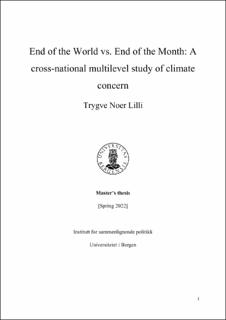| dc.description.abstract | The aim of this thesis is to assess some of the factors that might influence concern about climate change among people in different countries and over time. As part of this, I have analyzed whether the “finite pool of worry” theory can explain some of the variation in climate concern. This theory states that worry about one issue, for example climate change, will decrease as concern about other global issues increases due to external shocks. The two global shocks that I will test for are the financial crisis, and the outbreak of corona. The question is whether the financial crisis led to a decrease in climate concern in the European countries analyzed in the thesis, and whether the coronavirus outbreak led to a reduction in climate concern in Norway. To answer the research questions, I have utilized multilevel modeling on a dataset consisting of 26 European countries from the Eurobarometer dataset and data from the Norwegian Citizen Panel. The European dataset is measured from 2008 to 2017, while the Norwegian data consists of 18 650 individuals surveyed from 2013 to 2021. The results give support to the theoretical explanations presented in the thesis. I find that both the coronavirus outbreak and the financial crisis seem to have led to a decrease in climate concern. The results show that climate concern in Europe decreased as the financial crisis impacted European countries and increased as the effects of the crises wore off. As for the corona epidemic, the analysis show that climate concern decreased in Norway in the period after the outbreak. In the thesis I also look into other factors that might affect people’s climate concern. In Europe the results indicate that physical variables, like climate vulnerability and macro variables like Co2-emissions per capita, unemployment, and GDP per capita, when lagged by one year have a bigger effect than micro variables, like education and age . In Norway, the results show that there is a clear ideological divide in concern with left-wing voters displaying higher levels of concern. Other factors that are tested for seems to have little effect. As mentioned, the results support the finite pool of worry theory. Given that coronavirus outbreak was an external shock with consequences worldwide, this pandemic presents a unique opportunity for further testing of this theory. Since my data from Europe (except for Norway) does not cover the post-covid period, I have not been able to do this, Further research on this theory, its application om the coronavirus outbreak, and the consequences for peoples worry for climate change, is a task worthwhile undertaking | |
